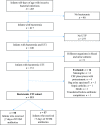Parenteral Antibiotic Therapy Duration in Young Infants With Bacteremic Urinary Tract Infections
- PMID: 31431480
- PMCID: PMC6855812
- DOI: 10.1542/peds.2018-3844
Parenteral Antibiotic Therapy Duration in Young Infants With Bacteremic Urinary Tract Infections
Abstract
Objectives: To determine the association between parenteral antibiotic duration and outcomes in infants ≤60 days old with bacteremic urinary tract infection (UTI).
Methods: This multicenter retrospective cohort study included infants ≤60 days old who had concomitant growth of a pathogen in blood and urine cultures at 11 children's hospitals between 2011 and 2016. Short-course parenteral antibiotic duration was defined as ≤7 days, and long-course parenteral antibiotic duration was defined as >7 days. Propensity scores, calculated using patient characteristics, were used to determine the likelihood of receiving long-course parenteral antibiotics. We conducted inverse probability weighting to achieve covariate balance and applied marginal structural models to the weighted population to examine the association between parenteral antibiotic duration and outcomes (30-day UTI recurrence, 30-day all-cause reutilization, and length of stay).
Results: Among 115 infants with bacteremic UTI, 58 (50%) infants received short-course parenteral antibiotics. Infants who received long-course parenteral antibiotics were more likely to be ill appearing and have growth of a non-Escherichia coli organism. There was no difference in adjusted 30-day UTI recurrence between the long- and short-course groups (adjusted risk difference: 3%; 95% confidence interval: -5.8 to 12.7) or 30-day all-cause reutilization (risk difference: 3%; 95% confidence interval: -14.5 to 20.6).
Conclusions: Young infants with bacteremic UTI who received ≤7 days of parenteral antibiotics did not have more frequent recurrent UTIs or hospital reutilization compared with infants who received long-course therapy. Short-course parenteral therapy with early conversion to oral antibiotics may be considered in this population.
Copyright © 2019 by the American Academy of Pediatrics.
Conflict of interest statement
POTENTIAL CONFLICT OF INTEREST: The authors have indicated they have no potential conflicts of interest to disclose.
Figures

Comment in
-
An End in Sight: Shorter Duration of Parenteral Antibiotics in Neonates.Pediatrics. 2019 Sep;144(3):e20191611. doi: 10.1542/peds.2019-1611. Epub 2019 Aug 20. Pediatrics. 2019. PMID: 31431481 No abstract available.
References
-
- Hoberman A, Chao HP, Keller DM, et al. Prevalence of urinary tract infection in febrile infants. J Pediatr. 1993;123(1):17–23 - PubMed
-
- Greenhow TL, Hung YY, Herz AM, Losada E, Pantell RH. The changing epidemiology of serious bacterial infections in young infants. Pediatr Infect Dis J. 2014;33(6):595–599 - PubMed
-
- Thomson J, Cruz AT, Nigrovic LE, et al. ; Pediatric Emergency Medicine Collaborative Research Committee (PEM CRC) HSV Study Group . Concomitant bacterial meningitis in infants with urinary tract infection. Pediatr Infect Dis J. 2017;36(9):908–910 - PubMed
-
- Wallace SS, Brown DN, Cruz AT. Prevalence of concomitant acute bacterial meningitis in neonates with febrile urinary tract infection: a retrospective cross-sectional study. J Pediatr. 2017;184:199–203 - PubMed
Publication types
MeSH terms
Substances
Grants and funding
LinkOut - more resources
Full Text Sources
Other Literature Sources
Medical

